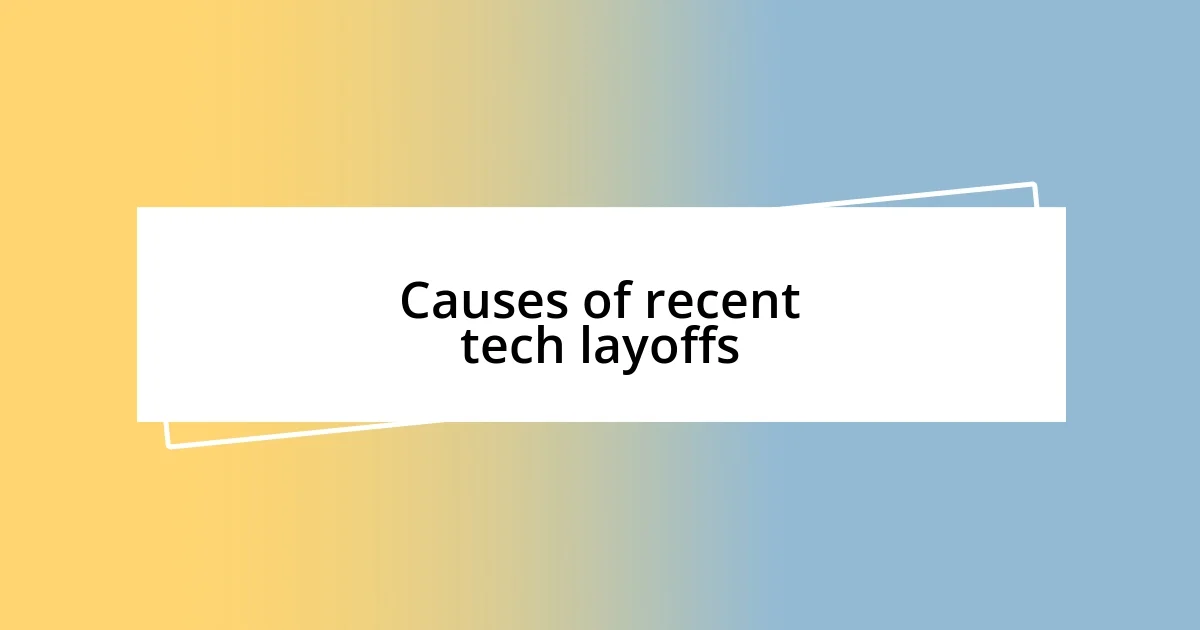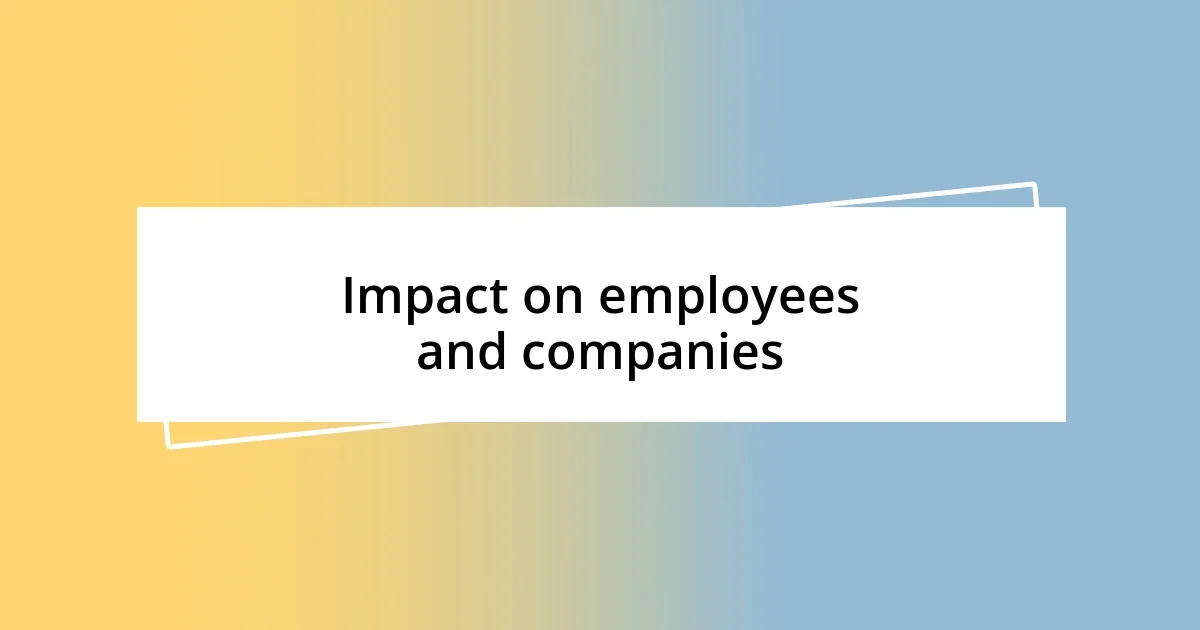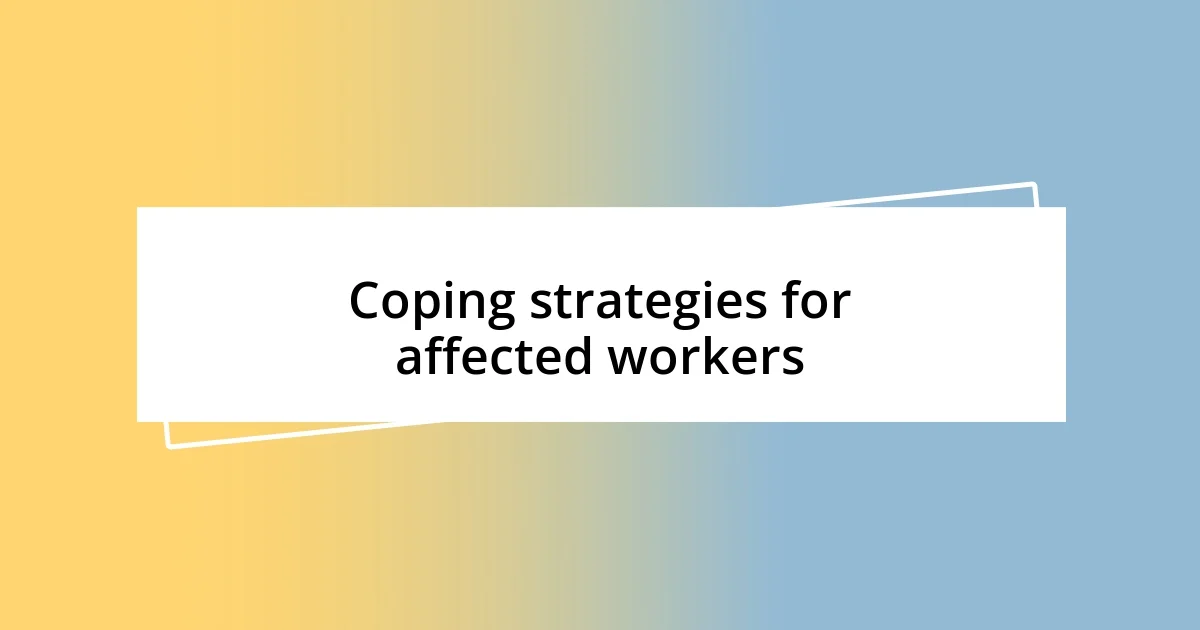Key takeaways:
- Tech layoffs are influenced by economic pressures, overhiring during growth phases, shifts in consumer behavior, and technological advancements.
- Layoffs have significant emotional impacts on employees, affecting their identity and productivity, while companies face long-term cultural destabilization and recruitment challenges.
- Amid challenges, there are opportunities for innovation and growth, with companies seeking talent in emerging fields and individuals finding success in freelancing and continuous learning.

Understanding tech industry layoffs
Tech industry layoffs can often feel like a jarring wake-up call. I remember when a friend of mine, a software developer, received the news that his entire team was being let go. He had invested years of effort and passion into his role, and suddenly, he found himself facing uncertainty. It made me question: how do companies decide who stays and who goes, especially when every individual brings unique strengths to the table?
The landscape of the tech industry is incredibly dynamic, often resembling a rollercoaster of growth and contraction. I’ve witnessed firsthand how economic pressures, like rising inflation or shifts in consumer behavior, can reshape a company’s priorities overnight. This constant change leaves employees on edge, wondering if they’re next. Have you ever felt that pit in your stomach when a meeting invitation pops up unexpectedly? It’s a feeling that resonates deeply within the tech community.
Moreover, it’s crucial to recognize that layoffs don’t just affect individuals—they ripple through entire teams and cultures. I’ve seen the morale of my colleagues plummet after layoffs, as trust in leadership erodes and fear of the unknown takes root. It prompts me to ponder: how can businesses balance financial needs with the very real human impact of their decisions? Understanding these nuances is essential for navigating the tumultuous waters of the tech industry today.

Causes of recent tech layoffs
The recent wave of tech layoffs can often be traced back to a combination of economic shifts and strategic realignments. As I’ve discussed with peers in the industry, many organizations are finding it increasingly challenging to adapt to a post-pandemic marketplace, where demand has fluctuated unpredictably. For instance, I remember a startup that surged during lockdowns but had to pivot drastically when consumer behavior reverted to pre-pandemic patterns. It’s a stark reminder of how quickly fortunes can change in the tech world.
Here are several key causes driving these layoffs:
- Economic Pressure: Rising inflation and recession fears have forced companies to tighten budgets and reduce costs.
- Overhiring During Growth: Many firms beefed up their teams during the pandemic, anticipating continued growth that didn’t materialize.
- Shift in Consumer Behavior: Changes in how consumers engage with tech products can lead to sudden drops in revenue.
- Focus on Profitability: Investors now demand more sustainable business practices, pushing firms to reduce workforce costs.
- Technological Advancements: Automation and AI integration have rendered certain roles obsolete, leading to restructurings and job cuts.
I’ve seen friends express their fears and frustrations about the unpredictability in our field, and it’s hard not to share in that anxiety. The sense of uncertainty can be stifling, making it crucial for employers to communicate transparently with their teams. It often feels like riding a wave—some days exhilarating, other days, you find yourself gasping for air.

Impact on employees and companies
The impact of layoffs on employees is profoundly personal and emotional. I recall a former colleague, once a vibrant contributor to team projects, who seemed to wither overnight after being let go. Watching her struggle to find her footing in a chaotic job market was heartbreaking. It’s not just about losing a paycheck; it’s about losing a sense of identity and purpose. This emotional turmoil can lead to diminished productivity and increased anxiety, affecting not only the laid-off individual but also their remaining teammates who might face heavier workloads and a fractured team spirit.
From a company’s perspective, layoffs can create a chilling effect that extends beyond the immediate financial relief. I’ve seen how the fear of job loss can dampen innovation and creativity, as individuals become more risk-averse, worried about being the next one on the chopping block. Companies might save on costs in the short term, but in the long run, they risk destabilizing their culture and losing valuable institutional knowledge. Fostering an environment where employees feel secure is essential, as this security often translates into better performance and a more robust competitive stance in the marketplace.
Overall, the ramifications of layoffs stretch far and wide—affecting morale, productivity, and the very fabric of corporate culture. In my experience, a single layoff can set off a chain reaction, leading to increased turnover and challenges in recruitment as potential candidates perceive a lack of stability. Striking a balance between financial imperatives and empathetic leadership is a tightrope walk that many companies struggle to master.
| Impact on Employees | Impact on Companies |
|---|---|
| Emotional distress and identity crisis | Short-term financial relief |
| Diminished morale and productivity | Potential long-term cultural destabilization |
| Increased anxiety and risk aversion | Challenges in recruitment and retention |

Coping strategies for affected workers
Finding effective coping strategies after a layoff is essential for maintaining mental health and moving forward. One approach I found helpful was establishing a structured daily routine. After losing my job, I experienced an overwhelming sense of loss—a mix of not knowing what to do with my days and a creeping anxiety about the future. By setting aside specific times for job searching, networking, and personal development, I regained a sense of purpose that made the uncertainty feel less daunting.
Networking can also play a critical role in recovery. I remember attending a virtual meet-up for laid-off tech professionals shortly after my own experience. It was cathartic to share our stories and support each other. Engaging in conversations with others in similar situations can alleviate feelings of isolation and sometimes leads to unexpected job opportunities. Have you ever thought about how powerful it is just to connect with others? It reminds us that we are not alone in this journey.
Finally, embracing continuous learning can be a game changer. In the aftermath of unemployment, I took a deep dive into online courses related to emerging technologies. Not only did this keep my skills sharp, but it also gave me something to look forward to each day. Focusing on growth rather than dwelling on the past can provide a healthier mental outlook. What new skills could you pursue that might open doors in this evolving job landscape? Sometimes, the answer lies in simply asking yourself what you’ve always wanted to learn.

Opportunities in a changing market
As I’ve navigated through the tech industry, I’ve seen how changing market dynamics can create unique opportunities for those willing to adapt. After a round of layoffs at my previous company, I noticed a surge of entrepreneurial spirit among my former colleagues. Some began exploring freelance work or launching startups, showcasing how adversity can spark innovation. Have you ever considered how such challenges might inspire you to carve out your own niche?
Additionally, I’ve come across companies that are actively seeking fresh talent, especially in emerging fields like AI and cybersecurity. I remember feeling a sense of excitement when I discovered job openings that aligned perfectly with my newfound skills. Those who take the initiative to upskill during periods of transition often find themselves better positioned to seize these opportunities. What if a layoff could be the catalyst for your next big career move?
It’s fascinating to see that the gig economy continues to flourish as traditional job structures shift. Personally, I ventured into consulting after leaving a full-time position, allowing me to work on diverse projects and collaborate with like-minded professionals. This experience taught me that flexibility can be a powerful advantage in a turbulent market. How might you leverage your talents in this evolving landscape to unlock new paths for growth and fulfillment?

Predictions for tech industry recovery
The tech industry is showing signs of resilience, and I predict we’ll see a gradual recovery in the coming months. I’ve noticed that companies are beginning to pivot back to growth, especially those that initially responded to economic pressures by tightening their belts. It seems like a natural cycle, doesn’t it? When one door closes, another often opens, and I’ve witnessed this shift firsthand as organizations begin to hire again, albeit cautiously.
In my experience, the recovery will largely depend on how well companies adapt to the lessons learned during these downturns. Have you ever considered how innovation thrives in challenging times? After a period of reflection, I found that many tech leaders are re-evaluating their strategies to focus on sustainability and long-term growth. It’s exciting to think that this could lead to more meaningful roles and projects that truly impact society.
As we move forward, I believe the emphasis on remote work and flexibility will redefine traditional office environments. Personally, I found adjusting to remote work not only liberating but also a chance to connect with a broader range of colleagues. This evolution may lead to a more diverse workforce as organizations seek distinct perspectives and skills, ultimately playing a crucial role in the tech industry’s recovery. Do you think a more inclusive approach could pave the way for greater innovation? I certainly do.














